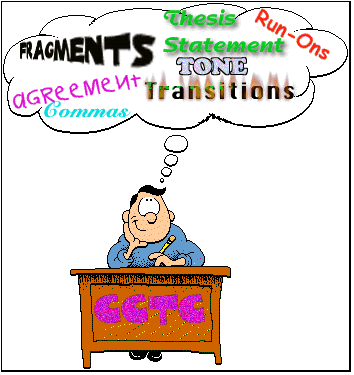Grading Standards for Essays
Eng. 111 & 112

Grading Standards for Essays Eng. 111 & 112 |
 |
1. Has a controlling sense of purpose (such as to persuade, to inform, or to express).
2. Exhibits a mature level of thought (that is, exhibits the ability to draw inferences and make analogies which show insight into the topic).
3. Is tailored for a given audience.
4. Achieves clarity throughout.
5. Has unified organization with an apt introduction, graceful transitions, and a vigorous conclusion.
6. Has a clear thesis developed thoroughly with abundant, fresh support (such as concrete details, examples, and reasoning; accurate and authoritative statistics or quotes).
7. Uses variety of sentence structure, precise word choice, emphasis, figures of speech.
8. Is free of major sentence errors, has few editing errors of any sort, and is free of common weaknesses in writing (ineffective use of passive voice, inappropriate word choice or shifts of persona, wordiness, etc.).
Note: The "excellent" paper is distinguished from the "very good" paper by a more assured prose style, more creativity in form or content, more subtlety in rhetorical strategy.
1. Has a controlling sense of purpose (such as to persuade, to inform, or to express).
2. Exhibits a mature level of thought.
3. Is tailored for a given audience.
4. Achieves clarity throughout.
5. Has unified organization with an apt introduction, clear transitions, and a good conclusion.
6. Has a clear thesis reasonably developed with effective support (concrete details and examples).
7. Uses variety of sentence structures and accurate word choice.
8. Has few errors in standard English and few stylistic errors (ineffective use of passive voice, inappropriate word choice or shifts of persona, wordiness, etc.).
Note: Mere absence of errors will not be rewarded with 5 points.
1. Displays a sense of purpose, which may not be consistently met.
2. Is logical but not necessarily thought-provoking.
3. Displays a sense of audience and usually addresses that audience appropriately.
4. Is clear throughout.
5. Is organized well enough to be easily readable, with a clear beginning, middle and end.
6. Has a clear thesis, reasonably developed with some concrete details and examples.
7. Has adequate but undistinguished word choice and sentence structures.
8. Contains few serious errors in sentence boundaries, grammar, punctuation, and spelling.
1. Fails to rise above the obvious content, substitutes repetition for development, or relies too heavily on a secondary source.
2. Lacks appropriate sense of audience.
3. Has lapses in clarity.
4. Has lapses in organization; shows weaknesses in introduction, transitions, and/or conclusion.
5. Has a single subject but no controlling idea.
6. Lacks concrete, specific details, relying instead on vague generalizations and abstractions, or undefended opinion for support.
7. Is inadequately developed for its purpose.
8. Has some errors in standard English: mixed constructions (confused sentences); sentence boundary errors (fused, fragment, comma splice); agreement errors (subject/verb; pronoun/antecedent), inappropriate shifts in tense, mood, voice, person; confusion of its/it's, their/there/they're, to/too/two, your/you're, etc.; basic punctuation errors of other sorts; excessive misspellings; or other problems listed on the editing checklist.
Note: Originality of style or thought will not excuse the deficiencies listed for 3- or 2-point papers.
1. Lacks content.
2. Lacks a sense of audience.
3. Consistently lacks clarity.
4. Lacks unified organization; lacks adequate introduction, transitions and/or conclusion.
5. Lacks a single subject and a controlling idea.
6. Has frequent errors in standard English (as listed above in item 8).
Note: Failure to fulfill the assignment or meet the deadline earns no points.